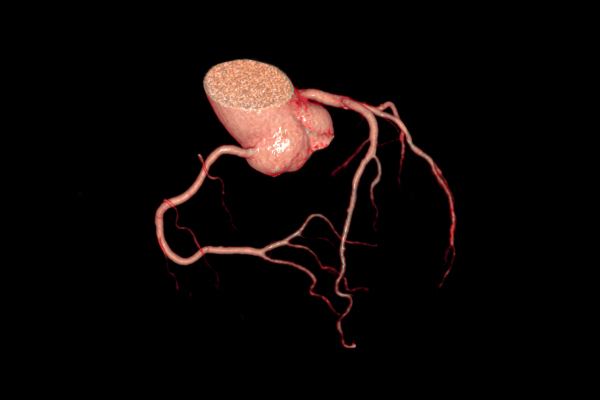Investigations
CT Coronary Angiography (CTCA)
A CT Coronary Angiography (CTCA) is a non-invasive diagnostic imaging technique that uses X-ray dye to visualise the blood vessels of the heart, including any narrowing or blockages, as well as structures within and outside the heart, such as the aorta. This procedure is conducted in a radiology centre using a specialised cardiac CT scanner, providing direct visualisation of the heart’s blood vessels with high precision and accuracy, without the need for invasive procedures.
This diagnostic test is typically recommended to investigate chest discomfort, particularly when a functional evaluation such as a stress test fails to produce conclusive results, or when patients are unable to exercise adequately.

You should inform your cardiologist if you have had a contrast (X-ray dye) reaction before so that proper precautions can be taken before scanning. In the radiology practice, you may be given extra cardiac medications to slow down the heart rate. During the scanning, intravenous contrast is injected to allow visualisation of the coronary arteries.
In our practice, Prof Sanjay Patel is an accredited CTCA reporter, who in many cases will personally review your scans and discuss the results with your cardiologist.
Call for Appointment
(02) 9646 4044
Investigations Expertise
Know everything about CT Coronary Angiography (CTCA)
What is a CT Coronary Angiography (CTCA)?
A CT Coronary Angiography (CTCA) is a non-invasive diagnostic test that uses a special X-ray machine to produce detailed images of the coronary arteries in the heart.
Why is a CT Coronary Angiography (CTCA) performed?
A CTCA is performed to assess the presence and severity of coronary artery disease, including blockages or narrowing in the arteries that can cause chest pain or other symptoms.
How is a CT Coronary Angiography (CTCA) performed?
During the test, the patient will lie on a table that slides into the CT scanner. A contrast dye is injected into a vein to highlight the coronary arteries, and multiple X-ray images are taken to create a detailed 3D image of the heart and arteries.
Is a CT Coronary Angiography (CTCA) safe?
CTCA is generally considered safe, but there is a small risk of radiation exposure from the X-rays and a very small risk of an allergic reaction to the contrast dye.
How long does a CT Coronary Angiography (CTCA) take?
The test typically takes around 30-60 minutes to complete.
Is there any preparation required before a CT Coronary Angiography (CTCA)?
Yes, preparation is required before the test, which may include fasting for a few hours before the test, stopping certain medications, and avoiding caffeine and smoking. You may also need heart rate slowing medications before the procedure. Patients should consult with our office for specific instructions.
Does someone need to accompany a patient for CT Coronary Angiography (CTCA)?
In general, patients do not require an accompanying person for a CT Coronary Angiography (CTCA) as the procedure is non-invasive and does not require sedation. However, some patients may feel anxious or uncomfortable during the test, and in such cases, they may benefit from having a family member or friend with them for support. Patients should consult with their doctor for specific recommendations regarding the need for an accompanying person during the CTCA procedure.
Call for Appointment
(02) 9646 4044
Investigations Expertise
Book an Appointment
Call for appointment/GP referral
(02) 9646 4044
